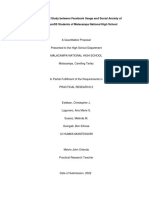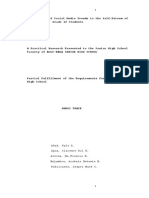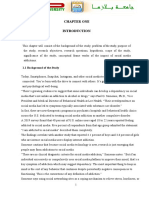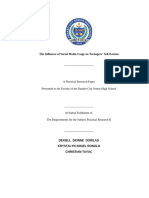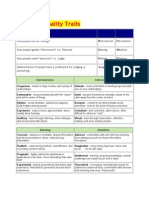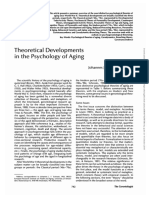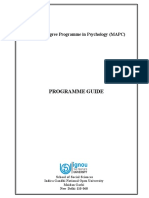Sadia Malik, Maheen Khan 2015
Sadia Malik, Maheen Khan 2015
Uploaded by
tiger psikologiCopyright:
Available Formats
Sadia Malik, Maheen Khan 2015
Sadia Malik, Maheen Khan 2015
Uploaded by
tiger psikologiOriginal Description:
Copyright
Available Formats
Share this document
Did you find this document useful?
Is this content inappropriate?
Copyright:
Available Formats
Sadia Malik, Maheen Khan 2015
Sadia Malik, Maheen Khan 2015
Uploaded by
tiger psikologiCopyright:
Available Formats
260
ORIGINAL ARTICLE
Impact of facebook addiction on narcissistic behavior and self-esteem among
students
Sadia Malik, Maheen Khan
Abstract
Objective: To investigate the relationship between Facebook addiction, narcissism and self-esteem and to see if
gender played any role in this equation.
Methods: The correlational study was conducted from February to March 2013 at the Department of Psychology,
University of Sargodha, Punjab, Pakistan. Using convenient sampling, two equal groups of male and female students
were enrolled from different departments of the university. Bergen Facebook Addiction Scale, Hypersensitive
Narcissism Scale and Rosenberg's Self-esteem Scale were used for evaluation. SPSS 17 was used for statistical
analysis.
Results: Of the 200 subjects in the study, 100(50%) each were males and females. Facebook addiction was positively
correlated with narcissism(r=0.20; p<0.05) and negatively with self-esteem(r=-0.18; p<0.05). Relationship between
narcissism and self-esteem was non-significant(r=0.05; p>0.05). Facebook addiction was a significant predictor of
narcissistic behaviour (β=0.202; p<0.001) and low self-esteem (β=-0.18; p<0.001). There were no significant gender
differences in the three variables (p>0.05 each).
Conclusion: Facebook addiction was a significant predictor of narcissistic behaviour and low levels of self-esteem
among students.
Keywords: Facebook addiction, Narcissism, Self esteem. (JPMA 65: 260; 2015)
Introduction having openness trait showed no influence of using social
Facebook is included in most popular websites with over networking sites. People with agreeableness and
600 million users in the world.1 Facebook users enjoy neuroticism also have no impact of Facebook.5
many benefits. In recent experiments, it is found that A recent study on university students exploring
distressed people feel better when they turn to narcissism on Facebook and self-promotional and anti-
Facebook.2 According to different opinions, Facebook social behaviours among Facebook addicts found
addiction means spending an excessive amount of time consistent results for its hypothesis.6
on Facebook. Normally, excessive Facebook use interferes
with important activities of a person's life.2 Facebook has A study defined self-esteem as the subjective evaluation
a great influence on our daily lives; we can observe that that a person makes and maintains about himself or
people from every age group are using Facebook. herself and the extent of belief in their capability, worth
and significance.5 It found no relationship between self-
The meaning of narcissism involves seeking attention or esteem and social networking sites (SNS) use. The
wanting to be liked. People who use social media sites excessive use of modern technologies is specifically
want to make relations with other social media users. limited to young people and, as a result, addictive
Previous studies found correlation between Facebook tendencies are more common among them.7
addiction and narcissism.3 In an individualistic society,
Facebook is a social and cultural norm.4 People with Some studies observed that Facebook usage had a
extrovert personality have a more intense tendency to be significant negative relationship with self-esteem
Facebook addicts.5 Results of a study showed that (University of Gothenburg in Sweden, 2012).8 One study
extroverts want unlimited contact with friends and the found that people with low self-esteem feel safer when
virtual world for higher stimulation and large social they use Facebook. It was also concluded that people with
network. It also revealed that people with low scores on high self-esteem usually post positive updates and get
conscientiousness spent more time on Facebook. People positive responses.9
It is also observed that young people have more chances
of falling victim to SNS addiction.10
Department of Psychology, University of Sargodha.
Correspondence: Sadia Malik. Email: drsadiamalik13@gmail.com Social media has become an important part of our life,
J Pak Med Assoc
Impact of facebook addiction on narcissistic behavior and self-esteem among students 261
especially for the youth. Facebook addiction has become environment (Table-1).
a common pattern in our colleges, universities and even
at workplaces. But the excessive use of Facebook is Facebook addiction had significant positive correlation
creating a lifestyle addiction which is causing different with Narcissism (r=0.20; p<0.05). It had significant
psychological and social problems such as depression, negative correlation with self-esteem (r=-0.18; p<0.05).
anxiety, loneliness, lack of self-esteem and poor social The findings were non-significant for narcissism and self-
interaction. Unfortunately, no proper attention has been esteem (r=0.05; p>0.05) (Table-2).
given to this serious issue in Pakistan. A very few Facebook addiction had significant positive effect on
researches have been conducted to explore the issue. The narcissism (β=0.202; p<0.001) and significant negative
current study was aimed at investigating the serious
impact of Facebook addiction on the self-esteem and
Table-1: Study Population (n=200).
behaviour of university students as it is evident from
literature that students are the most vulnerable segment Demographics F %
as far as Facebook addiction is concerned.
Gender
Subjects and Methods Male 100 50
The correlational study was conducted from February to Female 100 50
March 2013 at the Department of Psychology, University Family system
of Sargodha, Punjab, Pakistan. Using convenient Nuclear 90 43.3
sampling, two equal groups of male and female students Extended 110 56.7
were enrolled from different departments of the
university. Table-2: Descriptive Statistics, Alpha Reliability Coefficients and Pearson Correlation
between Study Variables (n=200).
Facebook addiction was measured by the Bergen
Facebook Addiction Scale (BFAS).11 It is a five-point likert Variables Mean SD α
scale ranging from "very rarely" to "very often". 1 2 3
Narcissistic behaviour was assessed by the Hypersensitive
Narcissism Scale (HSNS).12 It is a five-point likert scale 1-Facebook addiction 15.85 4.16 0.58
ranging from "very uncharacteristic" to "very - 0.20* -0.18*
characteristic". Self-esteem was measured by the Self- 2-Narcissism 28.06 5.40 0.59
- 0.05
Esteem Scale (SES) which contains 10 items. The scale has
3-Self-steem 17.78 3.84 0.65
a 4-point response format (1= strongly agree; 4 = strongly -
disagree). Scores range from 10-40, with higher scores
*p<0.05. SD: Standard deviation.
indicating higher self-esteem.13
Data was analysed using SPSS 17. Pearson product Table-3: Simple Linear Regression Analysis showing the effect of Facebook Addiction
moment Correlation, Regression analysis and on prediction of Narcissism and Low Self-esteem among students (n =200).
independent sample t-test were applied.
Narcissism Self-Esteem
Results Variables ∆R2 F β ∆R2 F β
Of the 200 students in the study, 100(50%) each were
males and females, while 110(56.7%) belonged to Facebook Addiction 0.034 6.28* 0.202*** 0.026 4.945* -0.18***
extended families and 90(43.3%) lived in a nuclear family ***p < 0.001; *p< 0.01.
Table-4: Influence of Gender (n = 200).
Male (n = 100) Female (n = 100) 95% CI
Variables M SD M SD t(198) P LL UL Cohn's d
Facebook addiction 15.87 4.35 15.84 3.98 0.039 0.97 -1.32 1.37 0.51
Narcissism 28.41 5.64 27.71 5.16 0.800 0.43 -1.04 2.45 0.43
Self-esteem 17.76 3.59 17.79 4.10 0.042 0.96 -1.27 1.22
M: Mean
SD: Standard deviation
CI: Confidence Interval.
Vol. 65, No. 3, March 2015
262 S. Malik, M. Khan
effect on self-esteem (β=-0.18; p<0.001) (Table-3). Facebook can enhance 'social self-esteem'.14 Facebook
may provide opportunities to people with low self-
In terms of gender, the findings were non-significant for esteem which helps to improve their self-esteem.15 A
Facebook addiction (p>0.05), narcissism (p>0.05) and self- study concluded that teenagers were more willing to
esteem (p>0.05). compromise their health, social life and studies for the
Discussion sake of fun and entertainment or whatever satisfaction
they get after using Facebook.16 Although there are many
The study was designed to explore the relationship
benefits of SNSs, but addiction can ruin the future of
between Facebook addiction narcissism and self-esteem.
teenagers. Moreover, many psychological problems have
Correlation analysis was run to test the first two
also been reported due to SNS addiction.17 Participants
hypothesis and results revealed that a significant positive
with lower self-esteem had correlation with greater
relationship existed between Facebook addiction and
amount of time spent on Facebook. It is also believed that
narcissism. Results also supported the second hypothesis
Facebook use is motivated by the need of belongingness
and revealed that Facebook addiction was negatively
and the need of self-presentation.17 All these studies
correlated with self-esteem. However, results of the
support the results of the present study which argued
present study are not supported by literature for the third
that people with low self-esteem spend more time on
hypothesis showing gender as having no effect on the
Facebook and they have more chances to be addict of
studied variables.
social networking sites.
Our results are consistent with earlier studies suggesting The generalisability of findings of the current study is
that Facebook addiction and narcissism are positively limited because the sample was only limited to the
correlated. One study said people who are narcissistic use students of a single university, and, as such, was not
Facebook in a self-promoting way which can be identified representative of the general population. Facebook is
by others. A personality questionnaire was given to being used all over the world and across all
almost 130 Facebook users and the data was interpreted.3 demographics.1 Replication of this study with other
It found correlation between narcissism and Facebook groups and variables is important. Perhaps in other
addiction. Beautiful and self-promoting profile pictures cultures, narcissism expresses differently on Facebook
were used by people with narcissistic personality. addiction. Furthermore, socioeconomic status, education,
Results of the present study are also consistent with a and birth order of students were not taken into account.
recent study on the effect of two socially disruptive Future studies should include all such factors as well.
elements of narcissism (grandiose exhibitionism and Conclusion
entitlement exhibitionism) on specific pattern of
Significant relationship was found between Facebook
Facebook behaviours. With few exceptions, the results of
addiction and narcissistic behaviour among students. It
that study were consistent with its hypotheses. It was also was also found that Facebook addiction significantly
found that self-esteem was negatively related with the predicted narcissistic behaviour and low levels of self-
studied narcissistic behaviours.6 esteem. Students spending more time on Facebook
Another study showed that Facebook users were not actually have low level of self-esteem and to compensate
narcissistic.4 A survey was conducted on 233 college it, perhaps unconsciously, they show an even more
students to predict whether the narcissistic personality is serious narcissistic behaviour.
developed because of excessive use of social media sites
References
or not. Results showed that people use Facebook and 1. Ahmad A. Social network sites and its popularity. Int J Reser Rev
other social media sites to inflate their ego via sharing Computer Sci 2011; 2: 522-6.
their photos and stories in their friends' circle as in 2. Toma CL, Hancock J. Affirming the self-online: Motives and benefits
person.4 Results of the present study are contrary to such of Facebook use: Paper presented at the annual meeting of the
International Communication Association. Boston, MA; 2011
results. 3. Buffardi LE, Campbell WK. Narcissism and social networking web
sites. Personality Soc Psychol Bull 2008; 34: 1303-14.
Another objective of the present study was to explore the 4. McKinney B, Kelly L, Duran RL.Narcissism or Openness?: College
relationship between Facebook addiction and self- Students' Use of Facebook and Twitter. Communication Research
esteem. Results indicated that the two were negatively Reports 2012; 29: 108-18
correlated. A recent study also found a negative 5. Wilson K, Fornasier S, White KM.. Psychological Predictors of
Young Adults' Use of Social Networking Sites. Cyberpsychology
correlation between Facebook addiction and self- Behavior Social Networking 2010; 13:173-7
esteem.6 6. Carpenter CJ. Narcissism on Facebook: Self-promotional and anti-
J Pak Med Assoc
Impact of facebook addiction on narcissistic behavior and self-esteem among students 263
social behavior. Personality Individual Differences 2012; 52: 482-6 31: 588-99.
7. Echeburua E, de Corral P. [Addiction to new technologies and to 13. Rosenberg M. Society and the Adolescent Self-Image. Morris
online social networking in young people: A new challenge.] Rosenberg. Princeton University Press, Princeton, N.J., Science
Adicciones 2010; 22: 91-5 1965; 148: 804
8. Denti L, Barbopoulos I, Nilsson I, Holmberg L, Thulin M, Wendebland 14. Valkenburg PM, Peter J, Schouten MA. Friends networking sites
M, et al. Sweden?s largest facebook study. Gothenburg research and their relationship to adolescents'well-being and social self-
Institute Report, University of Gothenburg; 2012 esteem. Cyberpsychol Behav 2006; 9: 584-90
9. Forest AL, Wood JV. When Social Networking Is Not Working 15. Ellison NB, Steinfield C, Lampe C. The Benefits of Facebook
Individuals With Low Self-Esteem Recognize but Do Not Reap the "friends": Social Capital and College Students' use of Online Social
Benefits of Self-Disclosure on Facebook. Psychol Sci 2012; doi: Network Sites. J Computer-Mediated Communication 2007; 12:
10.1177/0956797611429709 1143-68
10. Karaiskos D, Tzavellas E, Balta G, Paparrigopoulos T. Social Network 16. Farooqi H, Patel H, Aslam HM, Ansari IQ, Khan M, Iqbal N, et al.
addiction: A new clinical disorder? Eur Psychiatr 2010; 25: 855 Effect of Facebook Addiction on Medical University Students. Int
11. Andreassen CS, Torsheim T, Brunborg GS, Pallesen S. Development Arch Med 2013; 6: 40
of Bergen Facebook Addiction Scale. Psychol Rep2012; 110: 501-17. 17. Tariq M, Mehboob M, Khan A, FaseehUllah. The Impact of Social
12. Hendin HM, Cheek JM. Assessing Hypersensitive Narcissism: A Re- Media and Social Networks on Educationand Students of Pakistan.
examination of Murray's Narcissism Scale. J Res Personality 1997; Int J Computer Sci Issues 2012; 9: 407-11.
Vol. 65, No. 3, March 2015
You might also like
- Practical Guide To TATDocument14 pagesPractical Guide To TATwyhiso43% (14)
- Whatever Is Necessary!Document2 pagesWhatever Is Necessary!aliesh nateNo ratings yet
- Isra Medical Journal 2021Document4 pagesIsra Medical Journal 2021Adnan AdilNo ratings yet
- A Correlational Study Between Facebook Intensity Usage and Social Anxiety On AcDocument16 pagesA Correlational Study Between Facebook Intensity Usage and Social Anxiety On Achazellaybon34No ratings yet
- Influence of Facebook Addiction On The SDocument12 pagesInfluence of Facebook Addiction On The SBDE 2016No ratings yet
- Relationship Between Facebook Addiction and Loneliness of Filipino High School StudentsDocument11 pagesRelationship Between Facebook Addiction and Loneliness of Filipino High School StudentsBlack ViperNo ratings yet
- 13818735292469-2475 Muhammad SaleemDocument7 pages13818735292469-2475 Muhammad SaleemIsmat NaqviNo ratings yet
- Personality and Individual Differences: Tak Sang Chow, Hau Yan WanDocument6 pagesPersonality and Individual Differences: Tak Sang Chow, Hau Yan WanCaduRodriguesNo ratings yet
- Facebook Use and Adolescents' Emotional States of Depression, Anxiety, and StressDocument10 pagesFacebook Use and Adolescents' Emotional States of Depression, Anxiety, and StressTantan RamosNo ratings yet
- Chapter 1 SampleDocument15 pagesChapter 1 SampleUrcel DalmanNo ratings yet
- The Effects of Facebook Addiction To The Academic Performance of Selected Grade 9 Students of Mary Immaculate School For Academic Year of 2019 - 2020Document39 pagesThe Effects of Facebook Addiction To The Academic Performance of Selected Grade 9 Students of Mary Immaculate School For Academic Year of 2019 - 2020Angeline LimetaNo ratings yet
- PR2 Facebook Addiction 1Document18 pagesPR2 Facebook Addiction 1dumaguitjamaica1No ratings yet
- Impact of Facebook Addiction On The Study Habits of Social Work Students: With Special Reference To Tumkur DistrictDocument3 pagesImpact of Facebook Addiction On The Study Habits of Social Work Students: With Special Reference To Tumkur DistrictEditor IJTSRDNo ratings yet
- Blank TemplateDocument3 pagesBlank Templatepauldorado199308No ratings yet
- Facebook Addiction: An Emerging Problem: ArticleDocument3 pagesFacebook Addiction: An Emerging Problem: ArticleGeorgianaNo ratings yet
- FilesDocument39 pagesFilesandradeclare18No ratings yet
- 22-Article Text-28-2-10-20201122 PDFDocument12 pages22-Article Text-28-2-10-20201122 PDFDonnabel MariscalNo ratings yet
- Ermeje Final Paper Print May 28, 2024Document23 pagesErmeje Final Paper Print May 28, 2024e-MEL ChannelNo ratings yet
- A Correlational Study Between Facebook Usage and Social Anxiety of Grade 12 HumSS StudentsDocument9 pagesA Correlational Study Between Facebook Usage and Social Anxiety of Grade 12 HumSS StudentsAna Marie SalcedoNo ratings yet
- Neuroticism and Facebook Addiction: How Social Media Can Affect Mood?Document18 pagesNeuroticism and Facebook Addiction: How Social Media Can Affect Mood?Psikiatri 2022No ratings yet
- Contingent Self Worth and Facebook AddictionDocument9 pagesContingent Self Worth and Facebook AddictionPandaNo ratings yet
- Sharing, Liking, Commenting, and Distressed? The Pathway Between Facebook Interaction and Psychological DistressDocument8 pagesSharing, Liking, Commenting, and Distressed? The Pathway Between Facebook Interaction and Psychological DistressKamal DemmamiNo ratings yet
- Parasocial by Salwa AminDocument17 pagesParasocial by Salwa AminSalwa AminNo ratings yet
- Attachment Styles, Facebook Addiction, Dissociation and Alexithymia inDocument9 pagesAttachment Styles, Facebook Addiction, Dissociation and Alexithymia inAviNashNo ratings yet
- Assignment On: Asian University of BangladeshDocument12 pagesAssignment On: Asian University of BangladeshKhaliDhimanNo ratings yet
- Literature Review - Social Media and DopamineDocument4 pagesLiterature Review - Social Media and DopamineHazel SmithNo ratings yet
- Exploring How Social Networking Sites Impact YouthDocument21 pagesExploring How Social Networking Sites Impact YouthValerie EmithNo ratings yet
- 2017social Networking Sites Impact Youth With AnxietyDocument21 pages2017social Networking Sites Impact Youth With AnxietyDalia El HadidiNo ratings yet
- Group 6 Chapter 1 5Document51 pagesGroup 6 Chapter 1 5Katherine AliceNo ratings yet
- An Exploratory Study of The Relationships Between Narcissism, Self-Esteem and Instagram UseDocument11 pagesAn Exploratory Study of The Relationships Between Narcissism, Self-Esteem and Instagram UseEvy Sulfiani KomalaNo ratings yet
- CHAPTER 1,2,3 FinalDocument43 pagesCHAPTER 1,2,3 FinalMary Grace BatalNo ratings yet
- RSCH211 Talana Belle Joan 22013718410Document25 pagesRSCH211 Talana Belle Joan 22013718410Belle Joan TalanaNo ratings yet
- Article AnalysisDocument2 pagesArticle Analysisc29cs7wstsNo ratings yet
- Personality Assoc. W FB Use & Tend. (2020) - Addict. BehavDocument9 pagesPersonality Assoc. W FB Use & Tend. (2020) - Addict. BehavEmmanuel Manolis KosadinosNo ratings yet
- Chapt 1 5 Need Edit NG Conrec at Chapt5Document42 pagesChapt 1 5 Need Edit NG Conrec at Chapt5marilou tanNo ratings yet
- PSMUDocument12 pagesPSMUSyifaa IrawanNo ratings yet
- Article 1 - Problematic Social Media Use and Mental Health (Depression, Anxiety, And Insomnia) Among Lebanese Adults - Any Mediating Effect of StressDocument11 pagesArticle 1 - Problematic Social Media Use and Mental Health (Depression, Anxiety, And Insomnia) Among Lebanese Adults - Any Mediating Effect of StressreinajerdiNo ratings yet
- Facebook Usage and Depression Levels of Selected Filipino College Students PDFDocument16 pagesFacebook Usage and Depression Levels of Selected Filipino College Students PDFJay Bequizo IgloriaNo ratings yet
- Low Self-Control, Peer Delinquency and Aggression Among Adolescents in MalaysiaDocument7 pagesLow Self-Control, Peer Delinquency and Aggression Among Adolescents in Malaysiazvl hafizNo ratings yet
- Social MediaDocument9 pagesSocial MediaMohamed HussienNo ratings yet
- THE IMPACT OF F-WPS OfficeDocument12 pagesTHE IMPACT OF F-WPS OfficealiahadeelapadNo ratings yet
- Critique Paper in Probstats - Group 6Document10 pagesCritique Paper in Probstats - Group 6mykgamer14No ratings yet
- Chapter 1 To 3 3PSYC GANDocument40 pagesChapter 1 To 3 3PSYC GANmorla holaNo ratings yet
- Measuring The Negative Effects of The Facebook Dependence On The Students' University WorkDocument4 pagesMeasuring The Negative Effects of The Facebook Dependence On The Students' University WorkDragos IordacheNo ratings yet
- Artículo 2. Facebook Addiction.Document5 pagesArtículo 2. Facebook Addiction.aniapv2002No ratings yet
- PSYC1102 Lab ReportDocument8 pagesPSYC1102 Lab ReportAzn_JennNo ratings yet
- Problematic Social Media Use and Mental Health (Depression, Anxiety, and Insomnia) Among Lebanese Adults - Any Mediating Effect of StressDocument11 pagesProblematic Social Media Use and Mental Health (Depression, Anxiety, and Insomnia) Among Lebanese Adults - Any Mediating Effect of Stressey8151860No ratings yet
- Thesis LRKSHS (2019)Document13 pagesThesis LRKSHS (2019)Noel Asay100% (2)
- The Effects of Social Anxiety Towards The Behavior of Senior High School Students of Calinan National High SchoolDocument12 pagesThe Effects of Social Anxiety Towards The Behavior of Senior High School Students of Calinan National High SchoolIsmurpp NikentNo ratings yet
- Pr2 1Document20 pagesPr2 1krystalynronuloNo ratings yet
- Correlation studies (1) (1)Document3 pagesCorrelation studies (1) (1)cutenive6No ratings yet
- 2006 Article p79Document9 pages2006 Article p79Rori NyanNo ratings yet
- Chapter 1Document8 pagesChapter 1jerameelbmagnoNo ratings yet
- National Teachers College RESEARCH PROJECT PDFDocument19 pagesNational Teachers College RESEARCH PROJECT PDFAdrienne Deuna CamposagradoNo ratings yet
- Research Group 5Document21 pagesResearch Group 5nerizonzeusNo ratings yet
- The Level of Facebook Addiction Among Grade 12 Senior High School Students inDocument35 pagesThe Level of Facebook Addiction Among Grade 12 Senior High School Students inAllan BaluteNo ratings yet
- Review of Relat-WPS OfficeDocument7 pagesReview of Relat-WPS OfficeLindy SorelaNo ratings yet
- Chapter 2REVIEW OF RELATED LITERATURE ANDDocument7 pagesChapter 2REVIEW OF RELATED LITERATURE ANDJessica TolentinoNo ratings yet
- Social PsychologyDocument7 pagesSocial PsychologyjcramosNo ratings yet
- Parent-Adolescent Interaction and Risk of Adolescent Internet Addiction: A Population-Based Study in ShanghaiDocument11 pagesParent-Adolescent Interaction and Risk of Adolescent Internet Addiction: A Population-Based Study in ShanghaiAnindita Nayang SafitriNo ratings yet
- Chapter 1 To 5Document47 pagesChapter 1 To 5Irene Joy NonailladaNo ratings yet
- Understanding and Addressing Girls’ Aggressive Behaviour Problems: A Focus on RelationshipsFrom EverandUnderstanding and Addressing Girls’ Aggressive Behaviour Problems: A Focus on RelationshipsNo ratings yet
- MBTI FinalDocument18 pagesMBTI FinalNamrata GuptaNo ratings yet
- Leadership Traits and SkillsDocument14 pagesLeadership Traits and SkillsHumama Bano M. SadiqNo ratings yet
- HROB 2090 Midterm NotesDocument26 pagesHROB 2090 Midterm Notescalesi3392No ratings yet
- Industrial Organizational I O Psychology To Organizational Behavior Management OBMDocument18 pagesIndustrial Organizational I O Psychology To Organizational Behavior Management OBMCarliceGNo ratings yet
- PPM - Ob Sem IDocument192 pagesPPM - Ob Sem ISahil Ramteke100% (1)
- Personal Financial Planning: Strategies For Successful Practice ManagementDocument122 pagesPersonal Financial Planning: Strategies For Successful Practice ManagementDipanshu GargNo ratings yet
- 03 SaintekDocument8 pages03 SaintekIman HmtcNo ratings yet
- Paul Costa & Robert McCrae (Whataboutthem)Document7 pagesPaul Costa & Robert McCrae (Whataboutthem)Von Mariette Delmo Alave50% (2)
- DLP in UCSP W5 D1Document3 pagesDLP in UCSP W5 D1DERICK REBAY100% (5)
- Australasian PsychiatryDocument7 pagesAustralasian PsychiatryPutri RaveezaNo ratings yet
- AP Psych Prep 10 - Personality PsychologyDocument66 pagesAP Psych Prep 10 - Personality Psychologydms727No ratings yet
- MBTI Personality Traits: DescriptionDocument41 pagesMBTI Personality Traits: DescriptionNayan MhetreNo ratings yet
- Perdev Module 1 FirstDocument36 pagesPerdev Module 1 FirstCasquijo Lyndy KayeNo ratings yet
- New Text Document (2) FGFJGDocument1 pageNew Text Document (2) FGFJGraphaNo ratings yet
- Lembar Penilaian:: Nama: Hutami Dinda Prastiwi NIM: 18027 Tingkat: 3Document2 pagesLembar Penilaian:: Nama: Hutami Dinda Prastiwi NIM: 18027 Tingkat: 3Siska RNo ratings yet
- Case AnalysisDocument29 pagesCase AnalysisSuji.TNo ratings yet
- Full Download Essentials of Organizational Behavior: An Evidence-Based Approach Teresa (Terri) A. (Anne) Scandura PDFDocument61 pagesFull Download Essentials of Organizational Behavior: An Evidence-Based Approach Teresa (Terri) A. (Anne) Scandura PDFdemiarroy100% (2)
- Big Five Personality Traits and Travel Intention For Dark TourismDocument28 pagesBig Five Personality Traits and Travel Intention For Dark Tourismk sree manojnaNo ratings yet
- The Effect of Introversion in Social Life of Selected Grade 11 Students of La Consolacion College CaloocanDocument30 pagesThe Effect of Introversion in Social Life of Selected Grade 11 Students of La Consolacion College CaloocanEleonora Evangelista100% (1)
- Cattell Theory of PersonalityDocument4 pagesCattell Theory of PersonalityNeelam Choudhury0% (1)
- Theoretical Developments in The Psychology of Aging: Johannes J. F. Schroots, PHDDocument7 pagesTheoretical Developments in The Psychology of Aging: Johannes J. F. Schroots, PHDLizette VillanuevaNo ratings yet
- Albert BanduraDocument6 pagesAlbert Bandurapanderamji0123No ratings yet
- Ed 237 ReflectionlearningDocument44 pagesEd 237 ReflectionlearningJezzel Ren AuxteroNo ratings yet
- Human DevelopmentDocument12 pagesHuman DevelopmentBORNALES ROSALINDA S.No ratings yet
- Structural and Functional Equivalence of The Eysenck Personality Questionnaire Within and Between CountriesDocument32 pagesStructural and Functional Equivalence of The Eysenck Personality Questionnaire Within and Between CountriesNadina KovačNo ratings yet
- Programme Guide: Master's Degree Programme in Psychology (MAPC)Document93 pagesProgramme Guide: Master's Degree Programme in Psychology (MAPC)SNo ratings yet
- CRIMINOLOGY 3 Module 1 BarbaronaDocument32 pagesCRIMINOLOGY 3 Module 1 BarbaronaJoe Bert ButligNo ratings yet
- The Effect of Lifestyle, Brand Image and Personalities On Smartphone Purchase Decision of Consumers in Hochiminh CityDocument12 pagesThe Effect of Lifestyle, Brand Image and Personalities On Smartphone Purchase Decision of Consumers in Hochiminh CityInternational Journal of Innovative Science and Research TechnologyNo ratings yet


















